Note-Taking is of utmost importance in academics. It’s a vital skill for our learning. Notes help us organize and retain information for a long time. Among undergraduate students, notes are often improperly used and remain under-utilized. In this article, we will discuss the importance of note-taking and the basics of creating effective notes.
Back in our high school days, teachers used to dictate to us the concise points for the subjects. These points were simple to understand, relatively easy to remember, and well bounded by the syllabus of the course. We wrote all these concise points in a separate notebook, which we eventually called the Notes of that particular subject. At that time, memorizing the concepts from the notes was enough to score well in the examination.
For undergraduate-level studies, you cannot carry forward the same rules of creating notes (i.e Note-taking). An evolution in Note-taking is needed. This is because, in an undergraduate curriculum, most of the subjects are very broad. And to cover this broadness, we have to devise an ingenious way so that we do not end up creating bulky notes.
Is Note-taking effective?
Most of us already know that Good Notes lays the foundation of our understanding. Notes are the best tools to facilitate comprehension, memorization, and effective studying. As a result, it is very crucial to excelling in our examination.
Despite the ever-known importance of Notes; no one taught us, how to create a good one or how to use our notes efficiently?
In a class, a student who always scores well and the one who is struggling; both create their notes. Apart from other factors like focus, studying techniques, etc, good notes play a significant role in creating this difference. And this is well evident from the quality of notes written by the top-performing students. Creating good notes and properly using them do require some sincere efforts, but in the end, it is rewarding.
Here is an infographic depicting The best Note-Taking strategies which you can adopt,
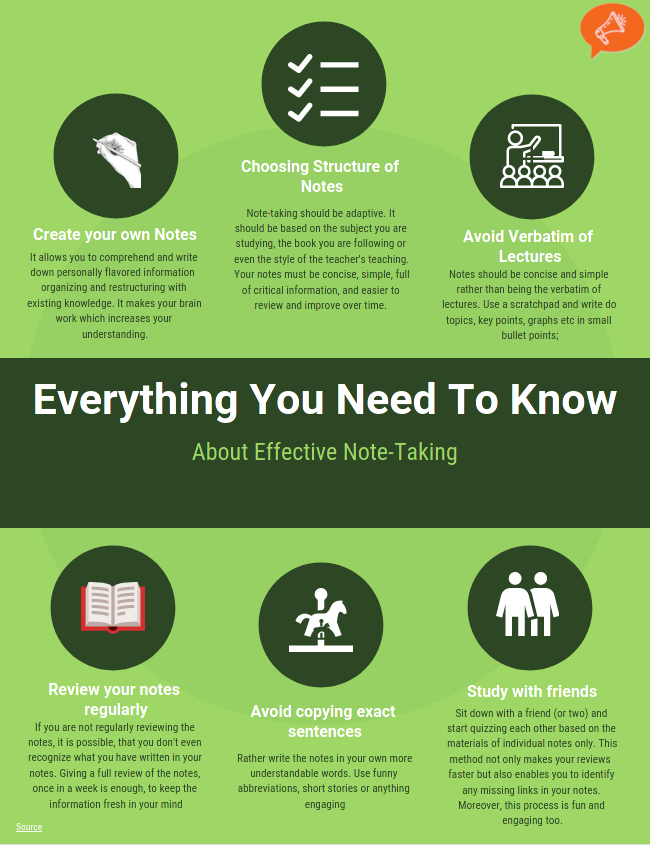
The best note taking strategies:
Below are the points which are fundamental to create good notes and use them effectively.
Create Your Own Notes

The most fundamental rule of creating good notes is that You Create your own Notes. I want this point to impact you in a similar manner as the bullet hit the normal glass! And there are enough reasons because of which I am putting emphasis on this point.
Firstly, by investing your time and efforts in creating notes, you are indirectly learning the material more actively. You not only comprehend and write down personally flavored information but before that, you need to acquire and filter the incoming sources ( lectures or textbooks), organize and restructure with existing knowledge. This will make your brain work which increases your understanding.
Along with that, in the process of creating the notes, your brain has already scanned the material multiple times. This will make you familiar with your notes and help to navigate through any specific information.
Lastly, you will develop a personal affection towards your notes. It is similar to that of a personal diary. As a result, there will be a natural tendency to read and improve the notes.
Choose a Structure of your Notes
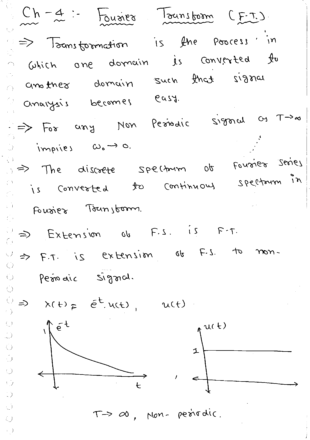
The above picture is a page from mathematics notes. It marks the beginning of a new chapter in Mathematics i.e. Fourier Transform. It is a typical example of our traditional way of writing notes. One can immediately point out the features of this note:
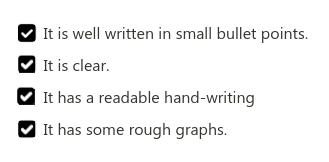
This is an example of a linear note type. While learning any concept-heavy subjects like Engineering and Mathematics; this style of note-taking has some limitations. They are:
- Space for future improvement; For example, later on, you got a more intuitive definition than that you wrote here. Since there is no space, you have to bury it somewhere else in the notes. This adversely affects the overall structure of the notes.
- Mapping of Concept: Since we have just started a new topic, it would be a perfect place to put the map of the concepts going to covered. Something like show below:

- Including References: Sometimes it is needed to link out the concepts with each other. It is a good idea to have a proper referencing system(in the form of number, pages number etc). This enable us to have easier navigation of their notes.
- Small practise Question: In order to complete the understanding of the concept. Practising question is mandatory. In notes, few conceptual questions can be included.
Here my emphasis is on the point we don’t need to always stick to the traditional way of linear note-taking style.
Note-taking should be adaptive and can be based on the subject you are studying, the book you are following or even the style of the teacher’s teaching. Therefore, you can write your notes in completely different layouts which can enable us to remove most of the limitations of linear note-taking. Any note writing which is not linear is termed as non-linear note-taking. It is experimentally observed that non-linear note-taker student performed on average 20% better than the those you follow linear style.
Few of the most popular Non-linear Note-taking techniques are:
- Cornell Techniques
- Mind Mapping
- Outline Method
- Boxing Method
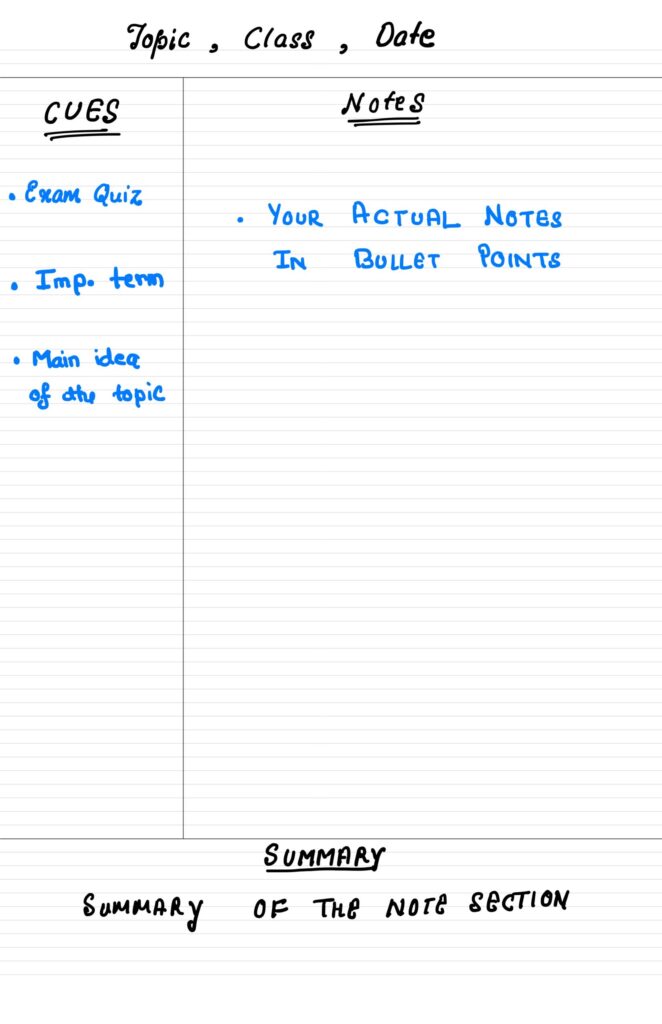
I haven’t included any description of each method so that the length and complexity of the article stay within limits. But, I would recommend you explore each of these note-taking techniques. An article describing each one of them in detail is linked below.
Well you may ask, which is the best note-taking technique?
And my personal opinion is none of them. Each of these techniques has some drawbacks and can not be used for every subject. Therefore, as previously mentioned, you need to adapt to incoming sources of information and change your note-taking style accordingly. The ultimate aim is to take notes in such a way that it is concise, simple, full of critical information, and easier to review and improve over time.
Avoid Verbatim of Lectures
It is a common mistake to note down every single point professor has said, and I get the point, you don’t want to miss any critical detail. But everything said by the professor can not be included in the notes either. This is because notes are aimed at being concise and simple. It shouldn’t be the verbatim of lectures.
It is a bad practice, which will eventually make your notes unnecessarily bulky and difficult to review. Along with that, it’s a linear note-taking style, which we have already discussed the limitation.
So, what should be done?
During lectures, rather than writing directly to your notes, use a scratchpad. Write down the names of topics, key terminologies, graphs or any numerical data being explained in the class in small bullet points; similar to the outline method. Along with that, carefully listen to your professor’s explanations (or better record her audio).
After the classes are over and you are back to your room, using the points written in the scratchpad, create the note following any of the layouts you prefer. There might be cases that you are missing out on some links. To solve that, you can talk to your classmates, listen to the recorded audio, refer to the textbook or ask the professor later in-office hours.
You may think, it involves a lot of work; and indeed it is. But your efforts will bear out fruits which will be more rewarding than what you can expect. By following this process, you are actively using your brain in creating your notes. Therefore, you will have more clarity and confidence over the concepts.
Avoid Copying exact sentences from your textbook
Like the previous point, copying the exact sentence from a textbook to your notes will make it bulky and ineffective. It is a step forward in creating a mini textbook!
You have to understand this fundamental of notes-taking that it should only contain information, which is completely understood by you; and it should be written in your own words as much as possible.
Even it is not necessary that you write it in plain English either. Most of my notes were a fine mixture of English and Hindi. You can even turn your notes into something very enjoyable to read. For example, one of my college friends used to write in a very informal way; so that it is fun to read and easy to remember. Another friend, extensively used drawing( similar to mind-mapping) to ease wordy explanation of the complex concept. And my method was to use funny abbreviations or create short stories.
Most of you may agree with me. The style and language used in the textbook are boring. And it tends to give good sleep rather than knowledge. And this is not the author’s fault, as it’s a standard textbook and it has to be in a formal way to satisfy a wider range of audiences. But, your notes are completely personal. Therefore, feel free to write in a way you want, by including graphs (or cartoons), shorts stories, etc. Just make sure you interpret the same meaning of the concept as given in the textbook.
Review your notes regularly
Just creating good notes is half-way, to get most out of it, you have to review regularly.
A normal semester extends for approximately six months then there is a major end-semester examination. Just before the exam, it is impossible to recall the concepts being taught in the first week of the course. This is where notes help us to quickly recall the concepts. If you are not regularly reading the notes, it is possible, that you don’t even recognize what you have written in your notes.
I have personally committed this mistake in my under-graduation. I kept on adding points to the notes as the classes progress and procrastinated reviewing them. As a result, just before the examination, when I have to revise everything from the start, I stumbled in the very first chapter of the notes.
Thus, it is necessary that you keep information fresh in your mind through regular review. Giving a full review of the notes, once in the week is enough.
Study with friends

Well, this point will not help you with note-taking. But it will help you increase the quality of your notes and make your reviews a lot easier.
When you have completed any minor topic in class and want to enjoyably review your notes, sit down with a friend (or two) and start quizzing each other based on the materials of individual notes only. In case, you give an incorrect (or partially correct) answer, write it down in your notes immediately. You can follow the same process to prepare yourself for any weekly tests.
This simple group-studying has many benefits. Firstly, it makes your reviews a lot faster. Secondly, it enables you to identify any missing links in your notes. And lastly, there are lots of fun to do it this way. Don’t just believe in my words, try it yourself and you will know what I am talking about!
Conclusion
Generally, students believe that notes are only useful to score well in an examination. But in actual, it is much more than that.
In this article, we saw the importance of good note-taking and few basics points to make notes more effective. In my opinion, good note-taking is the second most important skill a student must possess, besides maintaining good focus. I have talked about fixing the focus amid distractions in another article linked below.
Also read: Study similar to using Social media
The benefits of good note-taking does not limit to academics. Even in a professional environment, people use lots and lots of notes. For example, an Engineer inspecting the site for any process improvement have to take notes so that she can make a report on it. Or in case, a company is about to purchase a new component; during the negotiation process, one has to attend many meetings with different vendors. To make this series of meetings useful and have the best possible purchase, note-taking plays a crucial role. In general, in any meetings, besides listening to each other people do take extensive notes.
Students are needed to learn the craft of managing an enormous amount of information related to the discipline they are pursuing. For this endeavour, note-taking is an irreplaceable tool available to us, as we can not retain everything in your mind.
Happy Note -Taking!
Discover more from Talking Concept
Subscribe to get the latest posts sent to your email.
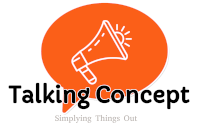



2 Comments
Pingback: Links Roundup #50 Notetaking Revisited: Notion - Personal Knowledge Management for Academia & Librarians
Pingback: یادداشتبرداری آکادمیک – فراسوی دانشگاه